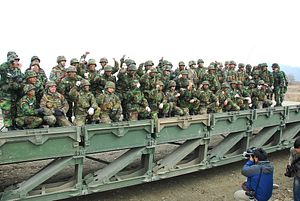Isolation or engagement? That’s the fundamental question that has long defined policy toward North Korea in both South Korea and the United States. Until recently, both schools of thought appeared relatively balanced in terms of influence in the halls of power. But in the wake of Pyongyang’s most recent nuclear test and rocket launch, the hawks have won the argument — at least for now — and inspired policymakers to take actions previously considered beyond the mainstream.
In South Korea, the closure on February 10 of Kaesong Industrial Complex, the last major cooperative project between the sides, has most powerfully illustrated this shift in consensus. President Park Geun-hye, who brought the axe down on the complex, had championed a policy of trust-building through mutual exchanges, so-called “trustpolitik,” despite coming from the conservative, engagement-skeptic side of South Korean politics. Pyongyang’s February 7 rocket launch, which was blasted by South Korea and the United States as a covert missile test and came just a month after its fourth nuclear detonation, abruptly shut the door on Kaesong — and any talk of reconciliation.
Kaesong, which started operations in 2004 under previous liberal President Roh Moo-hyun, had been close to untouchable even among South Korea’s conservatives. One of the most broadly supported symbols of the controversial “sunshine” years of inter-Korean summits and unconditional aid, the complex survived the tenure of Park’s predecessor President Lee Myung-bak, who was known for taking a hard line against Pyongyang. Despite a presidency that coincided with the fatal sinking of the warship Cheonan and shelling of Yeongpyeong Island, Lee never went further than threatening to shut the complex.
In justifying the closure, Park’s administration leaned on a claim that hawks have made for years: the North Korean regime was diverting money paid by the South for wages and facilities at Kaesong to its weapons programs. While pro-engagement voices in South Korea and elsewhere have criticized the move, the South Korean public appears to be on Park’s side. In one opinion poll carried out last week, 55 percent of respondents said they agreed with the closure, compared to 33 percent against.
In Washington, a similar resurgence in hawkish sentiment saw President Barack Obama on Friday sign into law a new sanctions bill targeting the assets of entities that do business related to Pyongyang’s weapons programs or human rights abuses. The bill passed the Senate without a single dissenting vote and received just two “nays” in the House of Representatives.
“It’s very simple — Kim Jong-un proved us right, and when our moment came, we were ready to offer better ideas,” Joshua Stanton, the writer of the blog One Free Korea and a longtime supporter of sanctions, told The Diplomat.
“Engagement failed. It meant well, and the idea of showing North Koreans the value of joining the civilized world is still valid, but we’ve wasted the last 20 years engaging all the wrong North Koreans in all the wrong ways.”
Stanton said the triumph of hawkish sentiment was years in the making, with roots in Obama’s policy of “strategic patience,” which critics have described as a grandiose term for doing nothing.
“The 2009 nuke test broke Washington’s faith in engagement and negotiated disarmament, but what was the alternative? The State Department hasn’t had a North Korea policy since then, so it came up with ‘strategic patience’ to create the illusion of one,” Stanton said.
“After the 2013 test, the hawks — both Republicans and Democrats — decided to offer their own concrete alternatives. The U.N. Commission of Inquiry report helped us appeal to liberals who shared our concerns about human rights. This diverse coalition worked for years to persuade legislators, scholars, and constituencies to change the policy paradigm. When Kim Jong-un nuked off, the dam broke in Congress.”

































